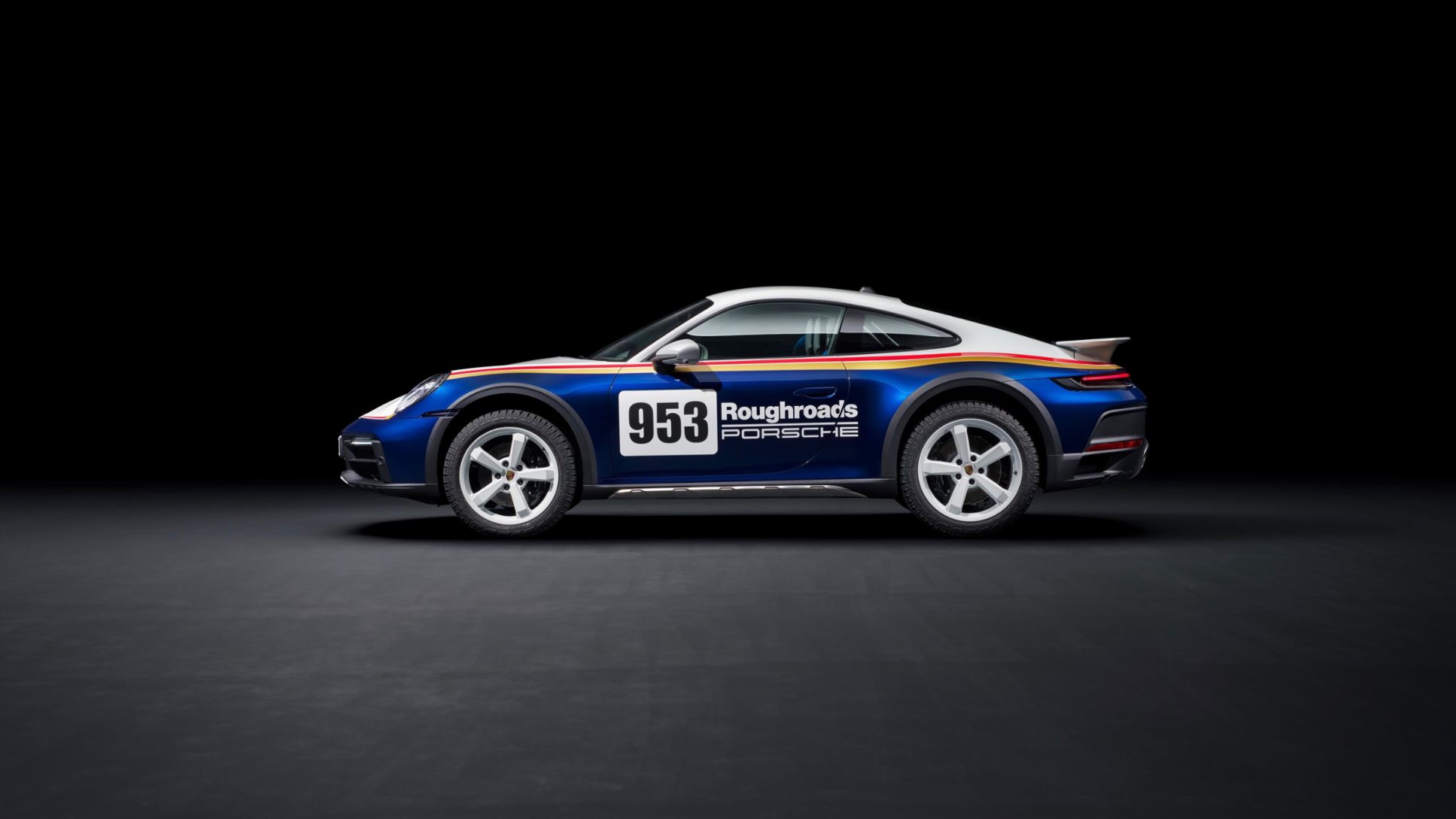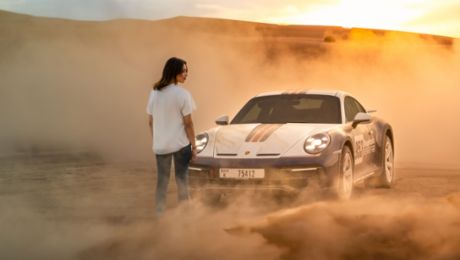One of the most striking new features of the Porsche 911 Dakar is the significantly increased ground clearance. At 161 mm, it rides some 50 mm higher than that of a 911 Carrera with sports suspension. When the standard lift system is activated, the ride height is raised by an additional 30 mm on the front and rear axles. This gives the 911 Dakar a maximum ground clearance of 191 mm.
The body can be raised to the high level manually using a button. In Offroad mode, the ride height increases automatically. The actuating elements in the spring struts are operated hydraulically. The lift system in the 911 Dakar is based on the same principle as the already-familiar front axle lift system. To equip the system for the more demanding requirements and for use as a ride height at speeds of up to 170 km/h for the front and rear axles, substantial modifications had to be undertaken. Among them was a pressure accumulator, which adjusts the system pressure as needed. The expansion tank was adapted to the increased filling quantity. The pressure level of roughly 110 bar in the familiar front axle lift was increased to 135 bar. Driving at the raised level is possible at speeds of up to 170 km/h. Above the 170 km/h barrier, the system automatically lowers the ride height to the normal level.
Longer spring travel and lower spring rates
The running-gear setup in the 911 Dakar follows the same basic philosophy as all Porsche 911 models: a huge performance range spanning driving comfort and sportiness matched with unlimited day-to-day usability. To broaden the use spectrum of the 911 Dakar, specific modifications to the setup were undertaken to meet both the on-road and off-road requirements. The spring struts used in the 911 Dakar are longer and offer greater compression and extension travel both at the front and rear. The spring rates are considerably lower. In addition, all standard chassis systems (PASM, PDCC dynamic anti-roll stabilisation and rear-axle steering) as well as the all-wheel-drive and differential control (PTM and PTV Plus) received new setups. Along with the familiar driving modes Normal, Wet and Sport, drivers now also have access to the two new modes exclusive to the Dakar: Rallye and Offroad.
In Rallye mode, the engine, PDK and accelerator offer a dynamic setup akin to the Sport+ mode in other 911 models. And the traction control also allows more wheel slippage on loose ground. Suitable surfaces for Rallye mode, which is tuned for exceptional driving pleasure, include gravel, wet grass and muddy, rutted forest paths. In Offroad mode, the engine, PDK and accelerator respond just like they do in Rallye mode, but the car is automatically adjusted to the higher ride height level and therefore has an additional 30 mm of ground clearance. At the same time, the all-wheel drive provides sufficient torque to the front axle to balance the speeds of the front and rear wheels. And the rear differential lock can be closed, ensuring that no rotational speed differences occur between the left and right rear wheels. Offroad mode therefore provides optimal traction on demanding terrain as well as high torque control anticipation. The Offroad setting is particularly well suited to dune surfing and driving over uneven surfaces on hard ground.
Spectacular acceleration with Rallye Launch Control
The new Rallye Launch Control is available in both Rallye and Offroad mode. Like the classic Launch Control, which remains part of Sport mode, it offers the driver maximum acceleration from a standstill. Since Rallye Launch Control is used on loose ground such as sand and gravel, it can handle slippage of up to 20 per cent. The wheels are allowed to spin within certain limits, which gives the driver a particularly intense and exhilarating acceleration experience.
The entire steering setup has also been reworked and adapted to a broader range of requirements. It impresses with its responsiveness on all surfaces and always provides clear feedback as to how much grip there is on the front axle. Part of the credit for the excellent traction in the new 911 Dakar on rough terrain goes to the all-terrain tyres from Pirelli, the first such tyres to be developed for a Porsche series-production model. Fitted as standard, the tyres are 245/45 R by 19 inches at the front and 295/40 R by 20 inches at the rear. With their larger cross-section, and therefore a higher sidewall, they contribute 10 mm to the increased ground clearance of the 911 Dakar. The bigger cross-section also necessitates the use of 19-inch wheels in the front and 20-inch wheels at the rear. This makes the rims on the 911 Dakar one inch smaller than those on the 911 Carrera GTS.
Off-road sports car tyres
Specially developed for the 911 Dakar, the all-terrain tyres boast pronounced off-road characteristics. Yet they offer sporty qualities and surprising levels of lateral grip on the road as well. The all-terrain tyre features a highly robust design. Its specially designed profile with a depth of more than 9 mm and the reinforced sidewalls and treads with two carcass plies give it a high cut resistance. The double carcass also increases the stiffness of the sidewalls by roughly 40 per cent, which is a boon during spirited driving over rougher terrain. With this all-terrain tyre, the 911 Dakar can not only handle demanding off-road conditions with ease, but also reach a top speed of 240 km/h. Pirelli P Zero summer and winter tyres, also newly developed for the 911 Dakar, are available as an option.


